How can we encourage pupils to travel actively? As the new term starts for Scottish schools, we spoke to our Edinburgh I Bike Schools Officer, Shaz, to reflect back on their first year in the job – and find out what makes the programme so special.
Pupils involved in our I Bike Schools programme in Edinburgh tell us what they think about cycling.
Walking, wheeling, cycling or scooting makes a big difference to the lives of school children.
Not only does it benefit their health and wellbeing, it helps them learn about their local area, develop wider social networks and ultimately become more independent.
The journey to school is a perfect opportunity for children to travel in active ways, arriving to class more relaxed and alert.
But for young people to establish these positive habits that they can continue into adulthood, they need support.
Sustrans Scotland’s I Bike Schools programme has been running for over 15 years, and encourages a whole school approach to active travel, enabling pupils to learn life-long skills and teachers to integrate these themes into the classroom.
Our research shows that young people attending schools involved with I Bike and similar programmes walk, scoot and cycle more than national averages.
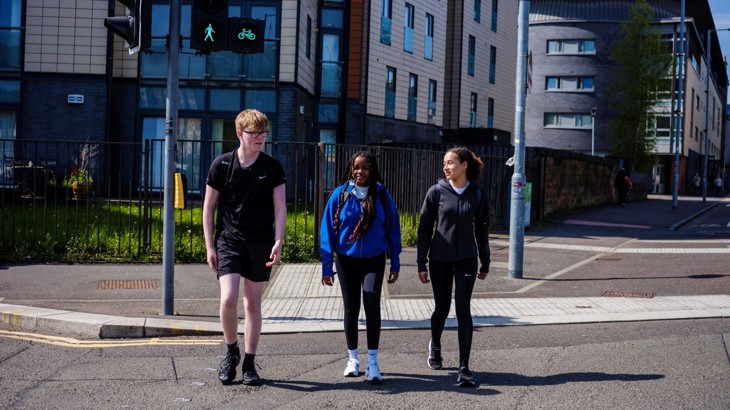
Pupils are more likely to travel actively if their school is involved a behaviour change programme like I Bike, our research has found. Credit: Brian Sweeney/Sustrans.
I Bike is currently running in seven local authority areas across Scotland: Edinburgh, West Lothian, East Lothian, Perth and Kinross, Dumfries and Galloway, Aberdeen City, and the Scottish Borders.
Shaz, our I Bike Schools Officer in Edinburgh, has been in the role for a year now, working with a cluster of primary schools that all feed into the same high school in the north of the city.
A first “I Bike-iversary" is certainly a moment worth celebrating. But how have they found it, since they started?
“It's epic. It's a dream job for me because it combines identity with purpose.
“I get to be myself in the role. And because it’s something I genuinely believe in, it's easier to share with others. It’s the magic of sharing something that matters.
“Obviously it depends on your personality, but it's not hard for me to be excited about my job and actually try and influence tiny humans. And adults too.”
An alternative solution to learning life-long skills
The I Bike programme, Shaz describes, is a bundle made up of bike skills (Bikeability), scooter skills, led walks, route planning, connections to the local active travel network, resources and training for teachers.
Officers work with a cluster of schools for 1 to 2 years intensively, and then provide light-touch support for a further 1 to 2 years.
“We aim to leave a group of schools enabled to continue with their own version of it.”
But despite the programme’s roadmap, Shaz emphasises that every school and location is different.
“I’ve managed to gain a lot simply through conversation. For me it’s been about finding that unique teacher who becomes proactive about it.”
It also depends on the activity they’re running. Naturally, scooting and walking are more accessible for younger age groups, whereas Bikeability tends to be geared towards P6 and P7.
“That’s with the idea that they’re already cyclists, but that’s not necessarily true. There can be a real mix of ability, so you need to be dynamic.
“For children who have never cycled before, we take the time to get them pedalling so they can join in with the wider group and aren’t left behind.”
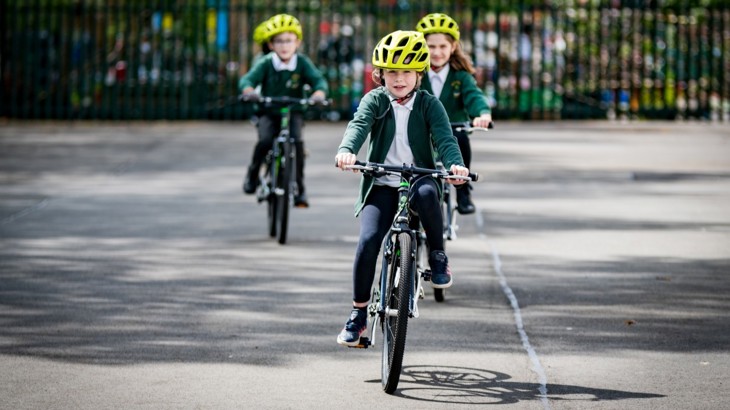
The I Bike programme caters for all different levels of ability, enabling all pupils to learn in a group environment. Credit: Andy Catlin/Sustrans.
With every day bringing its own unique challenges, what’s the common thread for Shaz?
“Being an alternative solution to learning. It’s a different kind of success to classroom success and a different way to measure achievement.
“It’s instant dopamine for the kids, as they know that they’ve done it themselves. It’s very much them and their ability.
“What I hope is that they can then take that with them and apply the learning process to other things.”
It’s all extremely relevant to Outdoor Learning, a key theme in the Scottish Curriculum for Excellence.
The way Shaz sees it, this is the natural way we learn. And in their experience, most pupils instinctively respond well to it.
“If they choose to cycle, scoot or walk in the future, whether they remember that relation through school or not, it's planting those seeds.
“Because it is about confidence, independence building, and empowering them to apply something they’ve learned to their everyday life.”
The influence of teachers and parents
And when it comes to the teachers, enabling them to role model the behaviours is key.
“If there are teachers who already cycle anyway, then it’s about linking that in with how they interact with the kids, using the skills they’ve already got.”
Over the last year, Shaz has also led pop-up activities with teachers. Recalling one scooter training session brings up especially funny memories.
“The kids are amazing because they're just unfiltered. But trying to get through a session of adults on scooters... they’re scoundrels.
“And it’s totally classic classroom dynamics. I remember in one of my schools, one of the teachers had to hush the rest of them!”
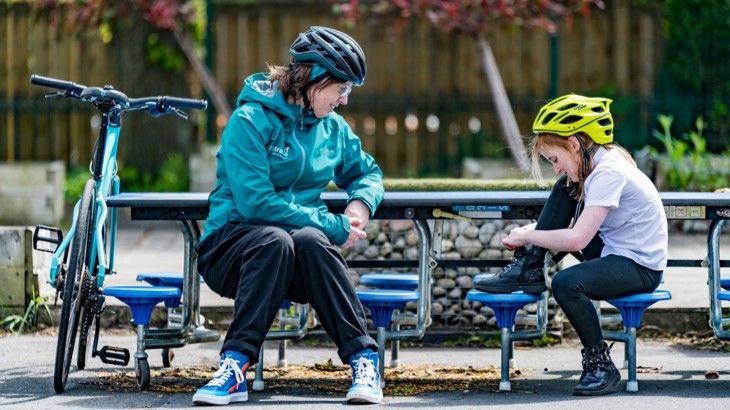
I Bike supports a positive influencing environment, to encourage healthy and climate-friendly travel habits. And remember, safety first. Credit: Andy Catlin/Sustrans.
Modelling active travel behaviours to children, however, is different.
It doesn’t involve encouraging a switch from engine-powered to people-powered movement.
With this in mind, is car culture something that’s talked about?
“When you’re doing something that involves a concept of travel, cars inevitably come up.
“The sessions evolve from the playground to the road. When we’re out on the road, hazards are present all the time. And even before you get out on the road, they’re a very real concept.”
Pupils can offer different perspectives on driving. But, Shaz says, it all comes back to influencing, whether that be by their parents or by their teachers.
Children as catalysts for change
With recent wildfires across Scotland this summer, including on Arthur’s Seat in Edinburgh, the climate crisis feels more local than it ever has before.
With transport emissions remaining our most stubborn, does Shaz feel like they are making a difference towards shifting car behaviour in the future?
"If you think about yourself in school and what you took with you afterwards, it can be unexpected. We don’t know what the kids will become.
“But just existing as a kid in this era now, they’re already coming from a time when climate change is very real.
“So I have to lead with that in mind. Not in an egotistical way, but in a way that says ‘this is essential to trying to make change for the future’.”
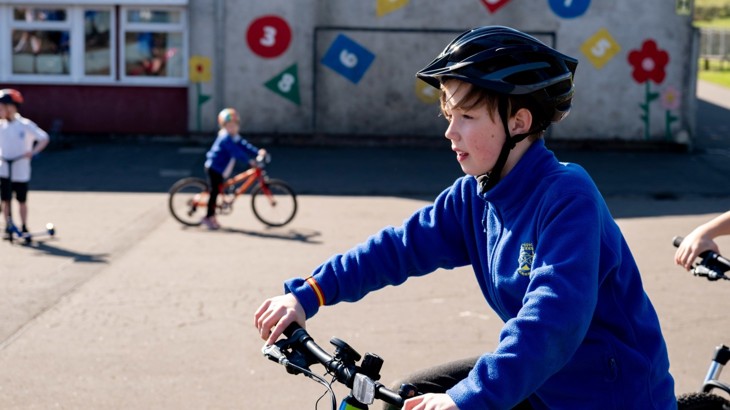
Building sustainable travel habits at an early age offers a pathway for kids to make impactful change in the future. Credit: Michael Kelly/Sustrans.
Shaz thinks I Bike is all the more impactful because it's integrated into pupils’ school education.
But, they’re quick to make something clear.
“We don’t actually make the change, though. We just suggest. And then they take it home and make the change, and hopefully inspire their parents as well.”
Overcoming barriers to active travel
Enthusiasm to make those changes, however, such as taking up cycling, can be met with barriers.
Safety is a major one, Shaz says outright.
Our Children’s Walking and Cycling Index showed that children in Scotland want to walk and cycle more, but they need more traffic-free routes to do so.
The I Bike programme is prioritising connecting up with new local infrastructure, to show kids traffic-free routes and encourage path networks to be used.
Other barriers Shaz has found in Edinburgh are to do with inner city living. If kids live in a flat, there’s often nowhere to store bikes.
“That’s one reason why scooters are more accessible – not only are they cheaper, they’re lighter and foldable so they’re easier to carry and store.”
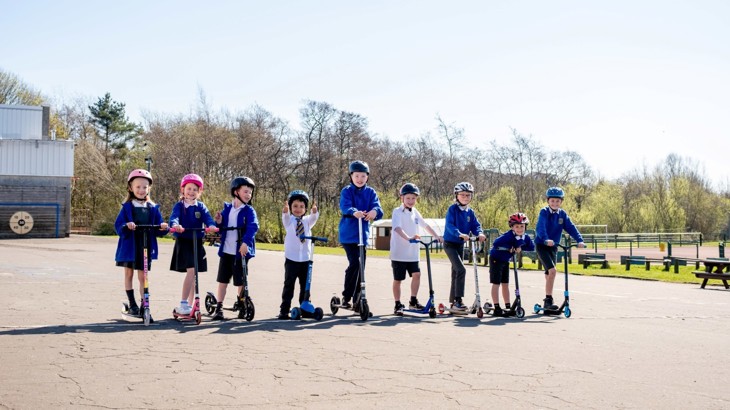
When it comes to cost and storage, scooting can often be a more accessible way to integrate active travel into a child's routine. That's a big thumbs up. Credit: Michael Kelly/Sustrans.
Another barrier can be gender, particularly when it comes to cycling - our Children’s Walking and Cycling Index showed more boys cycle than girls.
Has Shaz noticed this in their work with schools?
“It's evident of course, but it's a curious progression. I’ve been pleasantly surprised in primary school environments.
“Being aware of issues like gender bias hasn’t yet become ingrained. But somewhere there's a shift as kids get older.”
Research through our #AndSheCycles project a few years ago showed some of the most common reasons why teenage girls stop cycling relate to image and perception.
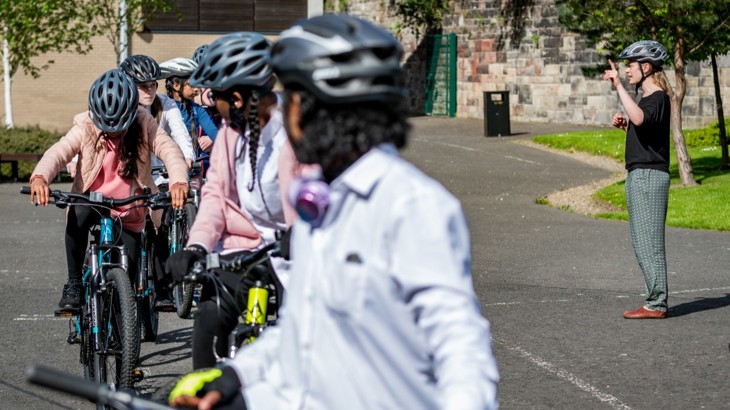
The drop-off in cycling among teenage girls is predominantly cultural, our research has found. Credit: Andy Catlin/Sustrans.
To bridge that gap, Shaz thinks it's about creating dedicated programmes for building girls’ self-confidence.
“I had a playground experience that sort of summed it up recently, where a boy said, ‘Yeah, I'm pretty much an expert a cycling’.
“I’m like, ‘OK, cool, show me your skills then.’ And then he crashed into a fence.
“In the same class there’s a girl cycling around the playground, in full control of her bike. And yet she said, ‘I’m just learning’.”
Find out more about our I Bike Schools programme.
Are you a teacher in Scotland? Discover our resources.
(No boys crashing into fences were harmed in the making of this blog)





